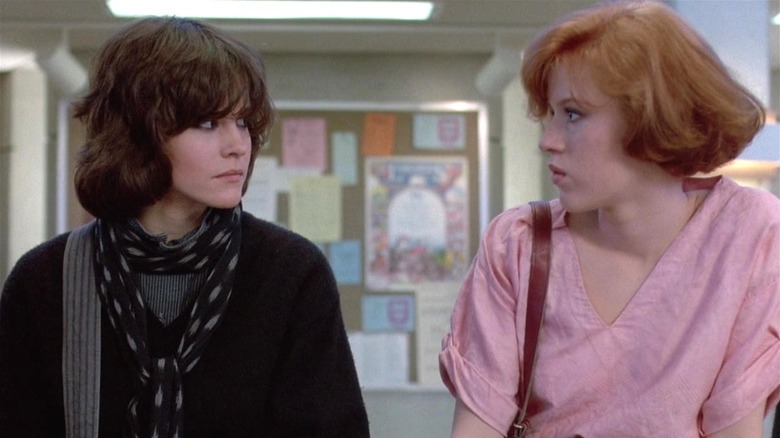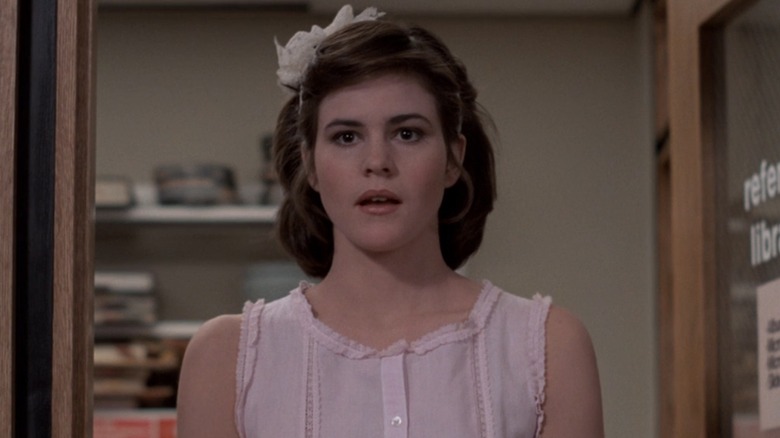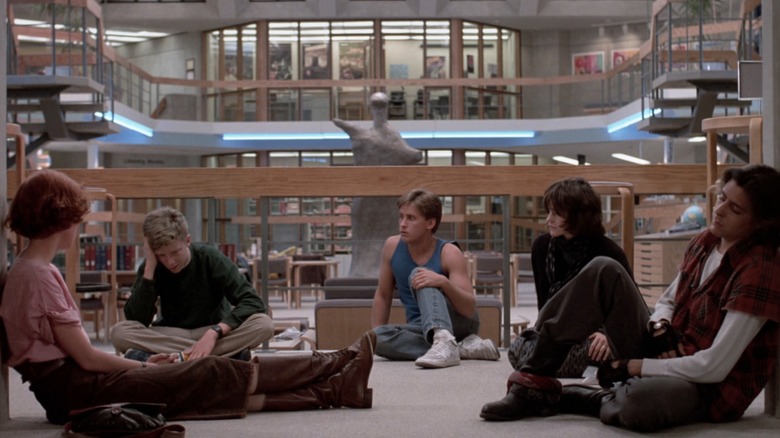Why Ally Sheedy's Breakfast Club Makeover Made Her Uncomfortable
Back in 1985, "The Breakfast Club" was released after having been made for a budget of $1 million — and earning $45 million at the box office. It went on to inspire so many coming-of-age films of the '80s, from "Stand By Me" and "Dead Poets Society" to "Say Anything." It turned its stars into "the Brat Pack," and John Hughes into a beloved filmmaker.
Of course, with the benefit of hindsight, some aspects of the film seem dated, but that doesn't change the fact that the movie was extremely influential. "The Breakfast Club" remains a cultural touchstone, one that paved the way for more character-driven stories. As the BBC noted, "The Breakfast Club subverts the stereotyped narratives it bands together, fashioning characters out of caricatures. It shows us that teenagers are complex human beings who can't just be categorised by adults bent on controlling them."
The roles played by young actors Molly Ringwald, Judd Nelson, Anthony Michael Hall, Emilio Estevez, and Ally Sheedy were, on the face of it, stereotypes. But their journeys through the film showed that they were much more than that. Ally Sheedy's "basket case" character, Allison Reynolds, even went through a physical transformation, in the form of a makeover.
Not everyone likes the makeover scene in 'The Breakfast Club'
The makeover of a teen girl is nothing new to films set in high school. In fact, this idea has been featured in so many flicks — from "Grease" to "She's All That" and "Clueless" — it has become a cliche, often wielded as a shorthand marking a turning point in a teenage girl's development. In "The Breakfast Club," though, fans felt the makeover didn't add a whole lot to the story. The Atlantic noted, "And the film's final 'makeover' of Sheedy's character from a black-clad pseudo-goth to a preppy-looking Ringwald clone is far less triumphant than the film thinks it is."
Fans have been split over this scene, too. Some on Reddit have acknowledged that the visual language of the movies means this was the most efficient way of showing that Allison's walls have come down, and that Claire (Ringwald) has stepped out of her cliquish mindset. As u/nakedonmygoat pointed out, "Helping each other with hair and makeup is one of the ways girls bond. No one does another girl's hair and offers her own lipstick and accessories to someone she hasn't decided to like."
Yet commenters say Allison looked just as good, or better, before, and that her image adjustment to make her more "preppy" so jock Andrew (Estevez) might find her more attractive was annoying. Along with that, some critics note, her quirkiness was lost. One critic on BrainSharper noted, "However, I thought she looked perfectly fine before the makeover. In fact, the makeover takes away the charm and mysterious aura that she previously had. Basically, conformity sucks."
Sheedy didn't like the scene, and said it evolved after she discussed it with Hughes
Ally Sheedy is among the detractors of the iconic makeover scene. She has spoken about how she disliked doing it in numerous interviews. "It was uncomfortable even when we were filming it," Sheedy told Page Six. "It was one of those things, though. It was the '80s, and we got to take this young woman who seems like a crazy person and make her into, you know, somebody pretty or whatever it was. But I agree Allison is much more delicious before the hair bow goes on."
She has also said she fought Hughes over the scene (per The Independent), saying that she wanted to take makeup off as a way of showing that Allison is warming to her new friends. She viewed it more as her character removing a mask she'd put on for her protection, and says that Hughes conceded that particular point. "It was more about revealing who Allison is. I wish it had been a little more of that and a little less of, 'Let's make her pretty,'" she explained (per Elle).
Sheedy acknowledged that the makeover was a rite of passage for her character. "It had to do, I guess, with her becoming more part of the group in some way. Not using what she looked like to put people off," the actress said, revealing that the scene did evolve as a result of her discussions with Hughes.
And while she has called the movie "nothing but a gift," the actress-turned-professor at The City University of New York has said some elements — like this one — don't stand the test of time. "It is one of the things that surprises me about people still loving it, even now," Sheedy said in an interview with David Yontef on Behind the Velvet Rope (20 minutes into the podcast). "That is an aspect of the movie that's problematic ... It's a mixed bag."


